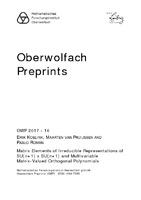Zusammenfassung
In Part 1 we study the spherical functions on compact symmetric pairs of arbitrary
rank under a suitable multiplicity freeness assumption and additional conditions
on the branching rules. The spherical functions are taking values in the spaces of linear
operators of a finite dimensional representation of the subgroup, so the spherical functions
are matrix-valued. Under these assumptions these functions can be described in terms of
matrix-valued orthogonal polynomials in several variables, where the number of variables is
the rank of the compact symmetric pair. Moreover, these polynomials are uniquely determined
as simultaneous eigenfunctions of a commutative algebra of differential operators.
In Part 2 we verify that the group case SU($n$+ 1) meets all the conditions that we impose
in Part 1. For any $k \in \mathbb{N}_0$ we obtain families of orthogonal polynomials in n variables with
values in the $N \times N$-matrices, where $N = \binom{n+k}{k}$
The case $k = 0$ leads to the classical
Heckman-Opdam polynomials of type $A_n$ with geometric parameter. For $k = 1$ we obtain
the most complete results. In this case we give an explicit expression of the matrix weight,
which we show to be irreducible whenever $n ≥ 2$. We also give explicit expressions of the
spherical functions that determine the matrix weight for $k = 1$. These expressions are used
to calculate the spherical functions that determine the matrix weight for general $k$ up to
invertible upper-triangular matrices. This generalizes and gives a new proof of a formula
originally obtained by Koornwinder for the case $n = 1$. The commuting family of differential
operators that have the matrix-valued polynomials as simultaneous eigenfunctions contains
an element of order one. We give explicit formulas for differential operators of order one
and two for $(n, k)$ equal to $(2, 1)$ and $(3, 1)$.

